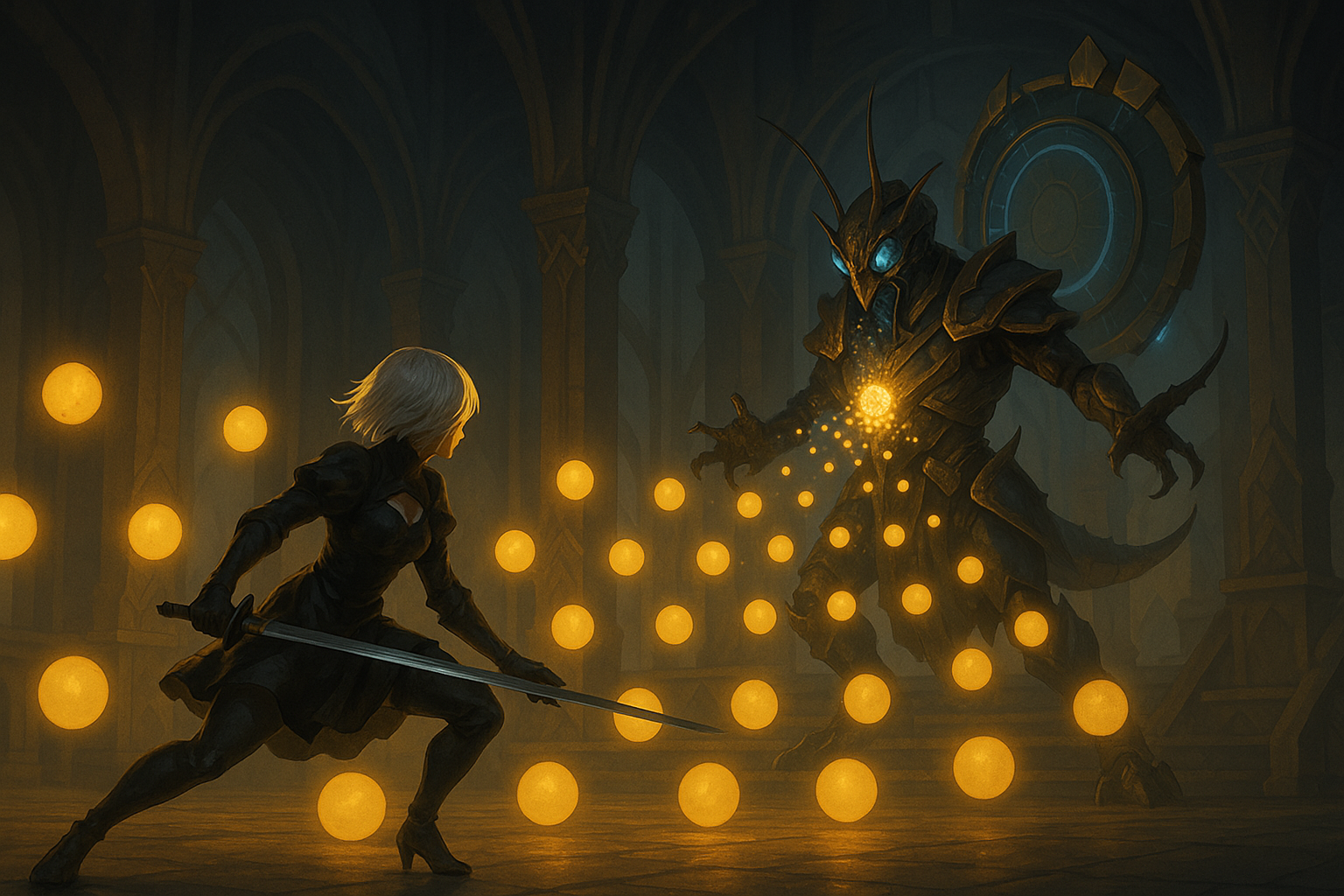What's Left When Meaning Breaks?
Eight years later, I'm still thinking about Nier: Automata. Here's why.

This weekend, I was participating in the raid beta test for the upcoming Mists of Pandaria Classic expansion in World of Warcraft.
We were testing the Heart of Fear raid instance, and we spent most of that time fighting the first boss, Imperial Vizier Zor'lok. During several phases of the encounter, he sends out a swirling pattern of orbs that you must avoid. They take a vaguely spiral shape, but on the hardest difficulty, there are multiple overlapping spirals that travel at different speeds. They hurt, a lot, and so your personal mandate is: dodge, or die.
I was struck by a nagging sensation that I'd seen this before, and I don't mean that I remembered this fight from MoP's original launch back in 2012.
Oh, this is a bullet hell fight.
Wait, What's That?
Bullet hell isn't a particularly common genre in the West. In Japan, it's known as 弾幕, or danmaku, which roughly translates as "barrage" or "bullet curtain." It's a subgenre of shoot-'em-up video games, where the player is faced with large amounts of projectiles the player is required to dodge (typically while also shooting back).
Our first "major" example to cross over from Japan was Ikaruga for the GameCube in 2001, which was critically well-received, but didn't sell very well. The GameCube had a relatively modest install base compared to other contemporary video game consoles, estimated to be between 22-26 million units. Despite this, top tier GC titles (like Super Smash Bros. Melee) would sell millions of copies. By contrast, Ikaruga's first week in the US sold under 7,000 copies, at which point numbers become trickier to find. Even in Japan, and including both Dreamcast and GameCube printings, only 33,860 were sold.
To say it was sold catastrophically is an understatement, and although it later developed a cult following (enough to be released on Steam and Xbox Live), I think everyone just assumed that the genre was too niche for the West.
With sales numbers that poor, the only way we'd see another bullet hell game was for a developer to come along and say: "I don't care what they will BUY, I'm going to make the game I WANT TO MAKE."
Along Came Nier: Automata
To say that Nier: Automata (which I will henceforth abbreviate as N:A) is an odd duck is an insult to strange waterfowl of the Anatidae family.
It was directed by a man who wears a creepy moon-headed mask in interviews and insists he’s “just here for the paycheck.” His name is Yoko Taro, and he’s probably lying.
This game shouldn’t have existed. The original Nier (2010) was a weird, genre-bending, emotionally devastating mess that critics didn’t quite get and almost no one bought. It was also beloved by the few who did play it. (SOUND FAMILIAR?)
The soundtrack? Stunning.
The story? Wildly ambitious.
The combat? Kind of janky.
A beautiful failure.
So Nier: Automata was a sequel that didn’t seem likely, let alone inevitable. But somehow, it got greenlit. This time, they handed the combat over to PlatinumGames, a studio known for slick, stylish action (think Bayonetta, Metal Gear Rising: Revengeance). Square Enix handled the publishing, and Yoko Taro handled the writing, directing, and metaphysical trauma.
What came out the other side wasn’t just an improvement. It was a reinvention. Released in 2017, N:A was both a critical and commercial success. It sold millions. It won awards. It launched anime, novels, crossovers with Final Fantasy. It was an unexpected and unqualified success.
A Brief Overview of N:A
N:A takes place thousands of years from now. Humans have fled to the moon, as Earth has been overrun by alien-built machines. The only ones left fighting are YoRHa androids — sleek, tactical, purpose-built humanoids. You are told the machines are mindless automatons, mechanical simpletons built by a long-dead alien race, still carrying out their final directive — to destroy both humans and androids.
You initially play as 2B, a combat android who looks like a fetish model: blindfolded, with thigh-high leather boots, stockings, a black miniskirt dress with a slit that goes up to the waist, and a ridiculous giant katana. You are accompanied by 9S, a scanner/hacker android who looks like a prepubescent schoolboy: also blindfolded, with shorts, an odd double-breasted leather tunic/coat, and a much smaller katana.
Your mission? Exterminate the machines and win the war for your human masters.
You start the game and quickly begin carrying out your task. And of course, most machines you encounter are hostile and do attack you on-sight. But you quickly begin to see anomalies. Some machines are peaceful. Some have even formed small villages and societies. A few have even begun worshiping primitive gods. And yes, they're the minority, but the more time you spend among them, the more the lines between android and machine begin to blur.
Who is the real enemy? What's actually left of the absent humans? And why does this feel so damn familiar? Even from the beginning, you can't shake this sense of déjà vu, like you've been here before.
The story is iterative. You play through it multiple times, from multiple perspectives. And the story fractures, loops, and rebuilds itself with each playthrough. Every time you think you understand what's going on, the game smirks and hands you another layer and dares you to keep going.
And you will. You're in too deep. You can't help but wonder how it all ends, even though the more you uncover, the more it hurts inside.
The Music is Truly Singular
Just from the track from the opening mission, I could tell that this soundtrack was something special. It's a killer track, go listen to it.
It doesn't stop there, either. The rest of the soundtrack is phenomenal. It's haunting and beautiful and intense and reflective, it's all the adjectives and superlatives you'd expect from a top-tier soundtrack.
But it's not just good. It's transcendent.
And that's because it's not just about how it sounds. It's about what it does.
What really made me sit up and take notice was what happened when I got to the City Ruins theme, and realized that the soundtrack was dynamically adapting to the context.
Walking around outside? That's the standard version.
Step into a building? It becomes muted and echoed.
Get into combat? It becomes animated, adding urgency.
And hack into an enemy? It shifts into glitchy chiptune format.
Through all of these shifts, the melody stays the same, and with each shift you're still at the same place in that melody. It's not switching tracks so much as recontextualizing them, and it's at this point that you realize the game is actually running multiple versions of the same song, all the time, so that it's ready to instantly swap and respond to your actions, all without interrupting the emotional continuity.
The music in N:A isn't just background dressing. It's an intrinsic part of the game's architecture.
This is the soundtrack that made me rethink what a video game soundtrack can do.
Play. Iterate. Repeat.
N:A's other major architectural decision is how it structures the story. Most games' plot is an assembly of a set script of story beats, like a theatrical play or a film. You play through them and get to the end. Game over.
Do that with N:A, and you'll miss over 75% of the game.
Each playthrough of N:A is a Route. When you finish Route A, you might think you're done, but you're not. Route B shifts your perspective, gives you more information and context. Route C collapses the structure entirely. Routes D and E reframe your role entirely as a player.
Each time, the same story beats come back — but viewed from a new angle, with new knowledge. It's recursive storytelling, but it's not just for show. It’s systems thinking as narrative.
Every loop teaches you something new. Each playthrough makes you doubt what you know. It forces you to recontextualize your mental framework. And just when you think you've got it all figured out, the game reminds you: you don't.
It's iterative, it's agile, and it's deeply humbling.
The Weight of Philosophy
Most video games these days have plot — modern gamers demand more motivation than "your princess is in another castle."
Weirdly, the plot itself of N:A is not that complicated. Rather, it would be more accurate to say that the events are not that numerous. There isn't a lot of stuff that happens. That's because the plot of N:A not rooted in events so much as it is built around questions that need answers.
The game doesn't just want you to see — it wants you to think.
I am deliberately avoiding spoilers here, but you'll find that 2B's stoicism isn't coldness, it's a form of personal armor, forged by repetition. She's not carrying out duty, she's being punished; a weird combination of Sisyphus crossed with Romeo and Juliet. 9S is a curious fella, driven by a desire for truth and understanding, but he finds that the more he learns, the less anything really means.
You start wondering: What does it all mean?
Then: How do I know what's real?
Finally, you're confronted with: What's the point of it all?
This game blends existentialism with nihilism, and its set in a world that doesn't reward goodness. But it isn't evil — it’s indifferent. Which somehow hurts more.
The game isn’t philosophical because it name-drops Kierkegaard, or because the main character is literally named after a core existential question.
It’s philosophical because it makes you feel those ideas.
A Legacy To Remember
I don't have a clean ending here. That's okay, N:A didn't have one either.
The game's ending is haunting. As the final credits roll — set to one of the best songs of the entire soundtrack — you play as the little spaceship you piloted during the hacking minigames, as the bullet hell becomes progressively more and more difficult. And by the end, you will be overwhelmed. It does not matter how skillful you are, you literally cannot win.
You die. You are asked if you want to give up. You say no.
You try again, and fail.
You try again, and fail.
You try again, and fail.
And at your lowest moment, something changes. You hear a voice. And another. The music shifts into a chorus of voices. And suddenly, you are not alone.
Other players — or rather, the ghost data of other players who made the same choice — begin helping you. Their little cursor spaceships fly beside yours, intercepting bullets. Shielding you. Saving you.
Eventually, you make it through. The credits end. The game offers one last choice:
Are you willing to delete your save data to help a stranger complete this moment?
You will lose everything. But someone, somewhere, will be saved by your choice.
It's not just a final boss, it's a meta-moral challenge.
An act of shared defiance in a hopeless world.
A reminder that kindness is a mechanic too.
You are prompted to create a small message. You do.
Your story ends, so that someone you do not know, someone you will never meet, will benefit.
It's been eight years since I played it, and while I finished all the Routes, I only played the game the one time. I haven't touched it since. I don't know why, but I suspect I'm worried I'll ruin its perfection by playing it again, diluting the impact it had the first time.
It gave me questions. It gave me memories. It gave me a haunting sense that meaning isn’t found — it’s built. And sometimes, it breaks.
This game isn't about winning. It's not about achieving victory. It's about what's left, when all meaning collapses?
And crucially, who are you when it does?
